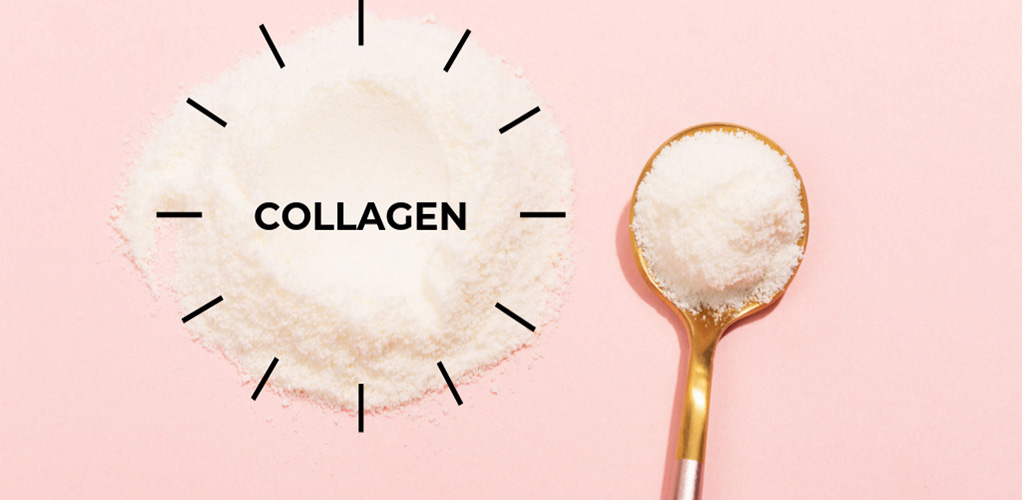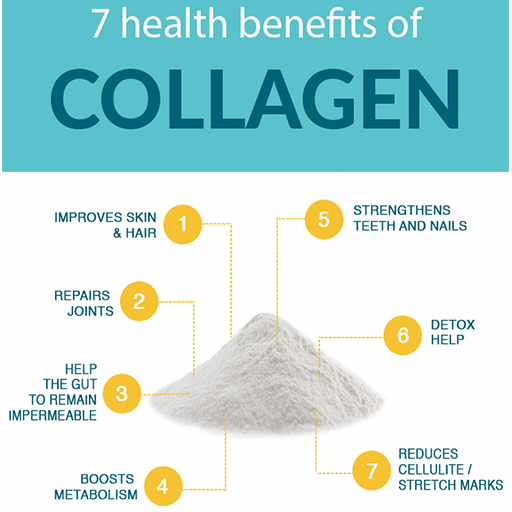Importance and Benefits of Collagen For Skin

Did you know that the most prevalent protein in your body is collagen?
Joints, bones, and most notably, your skin, all depend on collagen for skin proper function. As you get older, collagen naturally breaks down, but not everyone enjoys having thin skin and wrinkles.
What function does collagen play in the skin? How does collagen for skin impact aging symptoms? What can you do, most crucially, to safeguard and refill your collagen?
Our comprehensive guide on collagen for skin contains the answers to all of these questions as well as many more.
The Purpose of Collagen in Healthy Skin:
Collagen for skin is a protein that makes up your skin, tendons, bones, and cartilage. In addition to giving these areas strength and support, it aids in tissue repair, cellular communication, migration, and your body’s immune response.
Collagen is essential for the health and proper operation of your body. Important internal support is just one of the many benefits of collagen for the skin.
Collagen, a necessary protein, is what gives your skin flexibility and “bounce.” Collagen is produced throughout your lifetime, but as you age, it gradually decreases. Consider how soft, flexible, and firm a young child’s skin is. Children have such lovely skin because of their high levels of elastin and ideal collagen synthesis.
Advantages of Collagen for Skin:
- Skin is strong and firm due to collagen. Maintaining sufficient quantities of collagen in your body is essential for supporting basic health and preventing signs of aging skin.
- Increase skin elasticity Collagen for skin supplements, collagen skin care, and skin protection can all benefit your skin.
- Improved skin hydration, blood circulation, wound healing, scar prevention, reduction of stretch marks, reduction of dark spots, and prevention of scars are just a few of the benefits.
Various Collagen for Skin Types:
Actually, there are about 28 different varieties of collagen in the human body. Up to 90% of all collagen found in both human and animal bodies belongs to collagen for skin type 1, making it the most prevalent type of collagen. It is simple to obtain this form of collagen from a variety of animal and plant-based sources.
When looking for the best collagen source or supplement for you, you have a lot of choices. Any kind of collagen is beneficial for your skin, joints, and general health, according to research.
Collagen Obtained From Meat:
Non-human animals also contain collagen. Collagen supports the bodies and structural systems of all living things. Humans can obtain a large amount of collagen just by eating these animals. Somebody sections contain more collagen than others.
Animals, for instance, have a high concentration of nutrients that support healthy skin, such as collagen, in their skin, joints, and bones. People frequently consume collagen derived from animals in the forms of bone broth, bone marrow, and gelatin.
Although we don’t frequently offer up a heap of these animal parts on a plate, there are various ways we can eat animal collagen.
Oceanic Collagen:
Collagen is not always derived from terrestrial animals. Some of the best collagen for skin can also be found in fish and several marine invertebrates, such as jellyfish. For ethical, moral, or private reasons, some people decide to take marine collagen.
Collagen that comes from fish, jellyfish and other aquatic life is called marine collagen. Marine collagen, often known as fish collagen, is available as a powder, tablet, liquid, and topical product. Similar to collagen from land animals, marine collagen also readily absorbs into the body.
Animal-Free Collagen:
Vegans, who abstain from using any substances derived from animals, should avoid using some collagen products. Fortunately, those who are concerned about animal and environmental welfare can choose collagen alternatives made of plants.
The body doesn’t truly readily absorb collagen from animal sources. Animal collagen is instead broken down by the body into its constituent amino acids, which are then used to create new proteins.
The same critical amino acids that animal collagen provides are the main focus of plant-based collagen supplements and topical treatments. Any plant-based protein source, including soy, legumes, lentils, nuts, seeds, and mushrooms, can provide these amino acids. For those who eschew animal products, products containing snow algal powder are good natural collagen boosters.

How to Keep Your Collagen Safe?
While some collagen for skin loss is inevitable as you get older, you can halt the process and reduce the amount of change your body experiences. It’s essential to safeguard your body’s natural collagen if you want to delay the appearance of skin aging. Fortunately, there are a few straightforward measures you can take to guarantee that your collagen levels remain as high as possible.
1. Stay Hydrated:
One of the finest things you can do for your skin in general is to drink more water. The body’s motor oil is water, which ensures that nutrients are absorbed, cells can interact, and everything can move about freely. In addition to drinking a lot of water, moisturize your skin every day and at night with a lotion.
2. Avoid Direct Sunlight:
For a variety of reasons, sunlight is bad for the skin. It destroys cells, dries up the skin barrier, and breaks down collagen and elastin. Your skin may take a long time to restore its bounce and elasticity after these fibers have broken down. Wear sunscreen every day with an SPF of 40 or higher, and stay out of the sun as much as possible. Get to know about the importance and benefits of using sunscreen.
3. Quit Smoking:
Many individuals smoke cigarettes to unwind, however using tobacco products may harm your skin and increase stress. Cigarette smoke contains chemicals that harm collagen and elastin, reduce circulation, cause hyperpigmentation, and more. It’s crucial that you cut back on smoking if you smoke and are concerned about your skin.
4. Take Steps to Prevent Pollution:
Did you realize that air pollution may be harming the collagen in your skin? Inflammation and the production of free radicals by air pollution in your skin lead to collagen breakdown and wrinkle and sagging issues. High-pollution regions, such as inner cities, are often impossible to avoid, but you can protect your skin by washing it twice a day, exfoliating, and using sunscreen and protective moisturizer.
5. Consume More Antioxidants:
Leafy greens, blueberries, and cherries are just a few examples of foods high in antioxidants that are wonderful for your skin and overall health. Free radicals are neutralized by antioxidants, preventing them from taking your collagen. Stock up on your rich produce because foods high in antioxidants frequently also provide extra water and vitamin C.
6. Promote Healthy Skin:
Use skincare items that help collagen maintenance and the protection of your skin’s natural barrier. Retinol, vitamins C and E, and other ingredients support healthy skin and promote your body’s natural collagen production.


Ways to Increase Collagen for Skin:
However, if you already have low levels of collagen, protecting the collagen you do have won’t make much of an improvement in the flexibility of your skin. In addition to the above-mentioned precautions, use these advantageous sources to replenish your collagen.
Sources of Collagen in Nature:
You can increase your collagen levels to a certain extent without using specialized supplements or potent treatments. Choose tougher meats and increase your intake of collagen-rich foods like bone broth, fish skin, and gelatin.
Look for meals high in amino acids if you don’t eat meat or would prefer not to eat certain cuts. Your body may manufacture more collagen if you eat foods like fish, chicken, red meat, and eggs, which give your body the building blocks it needs. Make sure you consume the required daily quantity of zinc, vitamin C, and vitamin E since these nutrients are also necessary for collagen. Look for meals high in amino acids if you don’t eat meat or would prefer not to eat certain cuts.
Your body may manufacture more collagen if you eat foods like fish, chicken, red meat, and eggs which give your body the building blocks it needs. Make sure you consume the required daily quantity of zinc, vitamin C, and vitamin E since these nutrients are also necessary for collagen.
Skin care Items Enriched with Collagen:
Using a night creams can be all it takes to get gorgeous skin! Use skincare items that are formulated to strengthen and protect collagen to heal your skin from all sides. For the protection and to boost collagen formation, external skincare is equally as crucial as interior wellness.
Purchase a beauty balm with ingredients like ginseng root, shea butter, red algae extract, and snow algae powder that is all-natural and well-tested. These carefully chosen components enable cell renewal, which reduces wrinkles and results in plumper, firmer skin.
Encourage Luminous, Healthy Skin:
Collagen has various benefits for the skin. In addition to providing structural support for the skin, collagen is crucial for healthy skin and beauty that radiates from within.
Your source for all-natural, potent skincare products, vitamins, and more is Ingredient Secret. We’re committed to providing you with the most effective, scientifically validated results for your skin.
Visit Eshaistic to find out more about our anti-aging skincare products and watch the years fade away to reveal fresh, firm skin once more!




